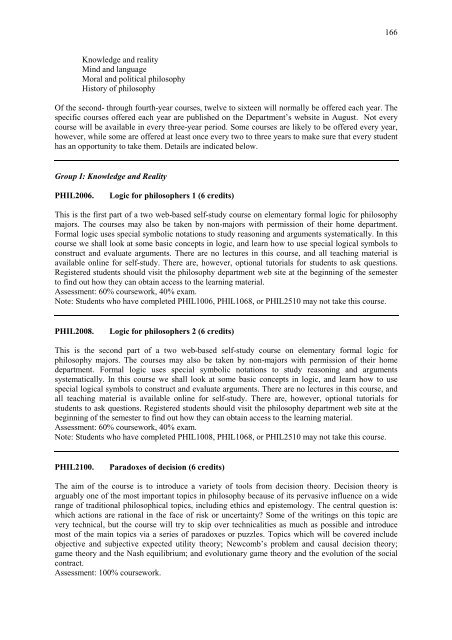(BA) (4-year-programme) - The University of Hong Kong
(BA) (4-year-programme) - The University of Hong Kong
(BA) (4-year-programme) - The University of Hong Kong
Create successful ePaper yourself
Turn your PDF publications into a flip-book with our unique Google optimized e-Paper software.
166Knowledge and realityMind and languageMoral and political philosophyHistory <strong>of</strong> philosophyOf the second- through fourth-<strong>year</strong> courses, twelve to sixteen will normally be <strong>of</strong>fered each <strong>year</strong>. <strong>The</strong>specific courses <strong>of</strong>fered each <strong>year</strong> are published on the Department’s website in August. Not everycourse will be available in every three-<strong>year</strong> period. Some courses are likely to be <strong>of</strong>fered every <strong>year</strong>,however, while some are <strong>of</strong>fered at least once every two to three <strong>year</strong>s to make sure that every studenthas an opportunity to take them. Details are indicated below.Group I: Knowledge and RealityPHIL2006.Logic for philosophers 1 (6 credits)This is the first part <strong>of</strong> a two web-based self-study course on elementary formal logic for philosophymajors. <strong>The</strong> courses may also be taken by non-majors with permission <strong>of</strong> their home department.Formal logic uses special symbolic notations to study reasoning and arguments systematically. In thiscourse we shall look at some basic concepts in logic, and learn how to use special logical symbols toconstruct and evaluate arguments. <strong>The</strong>re are no lectures in this course, and all teaching material isavailable online for self-study. <strong>The</strong>re are, however, optional tutorials for students to ask questions.Registered students should visit the philosophy department web site at the beginning <strong>of</strong> the semesterto find out how they can obtain access to the learning material.Assessment: 60% coursework, 40% exam.Note: Students who have completed PHIL1006, PHIL1068, or PHIL2510 may not take this course.PHIL2008.Logic for philosophers 2 (6 credits)This is the second part <strong>of</strong> a two web-based self-study course on elementary formal logic forphilosophy majors. <strong>The</strong> courses may also be taken by non-majors with permission <strong>of</strong> their homedepartment. Formal logic uses special symbolic notations to study reasoning and argumentssystematically. In this course we shall look at some basic concepts in logic, and learn how to usespecial logical symbols to construct and evaluate arguments. <strong>The</strong>re are no lectures in this course, andall teaching material is available online for self-study. <strong>The</strong>re are, however, optional tutorials forstudents to ask questions. Registered students should visit the philosophy department web site at thebeginning <strong>of</strong> the semester to find out how they can obtain access to the learning material.Assessment: 60% coursework, 40% exam.Note: Students who have completed PHIL1008, PHIL1068, or PHIL2510 may not take this course.PHIL2100.Paradoxes <strong>of</strong> decision (6 credits)<strong>The</strong> aim <strong>of</strong> the course is to introduce a variety <strong>of</strong> tools from decision theory. Decision theory isarguably one <strong>of</strong> the most important topics in philosophy because <strong>of</strong> its pervasive influence on a widerange <strong>of</strong> traditional philosophical topics, including ethics and epistemology. <strong>The</strong> central question is:which actions are rational in the face <strong>of</strong> risk or uncertainty? Some <strong>of</strong> the writings on this topic arevery technical, but the course will try to skip over technicalities as much as possible and introducemost <strong>of</strong> the main topics via a series <strong>of</strong> paradoxes or puzzles. Topics which will be covered includeobjective and subjective expected utility theory; Newcomb’s problem and causal decision theory;game theory and the Nash equilibrium; and evolutionary game theory and the evolution <strong>of</strong> the socialcontract.Assessment: 100% coursework.
















